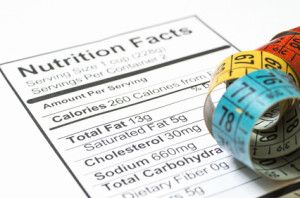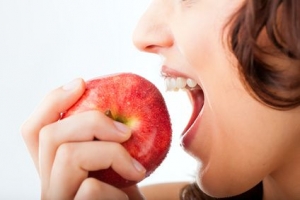
We’ve all heard that the golden rule to weight loss and diet is ‘calories in, calories out.’ 3500 calories equals a pound, so if we have a deficit of 3500 calories in a week, we’ll lose a pound that week, right? Cool, so I can eat what I like and lose weight as long as I eat 500 calories less per day!?
Well, not quite. Although it’s appealing to think that the key to weight loss is as clean and simple as a mathematical equation, it just doesn’t work that way. Carbohydrate, fat and protein calories are NOT equal in terms of their effect on body weight. While by definition their energy content is the same, the body processes these three different types of nutrients in different ways, and this has important implications for weight loss and weight management.
It turns out that what foods we put into our bodies is perhaps even more important than the overall calorie count. Let’s take a look at some of the reasons why a calories is not just a calorie.
1) Calorie Restriction Slows Your Metabolism
Many women think that the lower their daily calorie intake, the more weight they’ll lose. It is true that if you eat nothing, you’ll eventually waste away. However, for women who are trying to lose weight with a healthy diet, eat too few calories per day and you won’t lose ANY weight. How can this be true?
Our bodies are actually adapted to withstand periods of starvation by slowing down metabolism. So, once your body starts to figure out that less calories are coming in, it actually slows to make better use of the calories you give it. This can effectively stall your weight loss.

Between proteins, fats and carbohydrates, your body uses up the most energy to digest proteins – up to 20 times more than fats. High-fiber foods also take more energy to digest than low-fiber ones…so a 100 calorie apple will take more energy than 100 calories of sugary sweets or of refined white bread. This means that by choosing the right foods, we actually burn calories while we eat calories.
3) What You Eat Affects Your Appetite
These same foods that require extra energy to digest are the ones that help us feel satiated the longest. Lean protein and high-fiber foods (like fruits and vegetables) help keep you feeling full because they also take longer to digest. Sugars and refined carbohydrates like white rice and white bread take almost no energy and very little time to digest. They also strongly impact your insulin levels and will cause you to feel hungrier sooner. By choosing the right foods, you can control your cravings and keep your appetite at bay.
4) Different Foods Affect Your Metabolism Differently
A recent study was conducted by the New Balance Foundation Obesity Prevention Center that compared three different diets: a low fat diet (less than 20% of total calories from fat, a low-carb Atkins-style diet (10% of total calories from carbs) and a low-Glycemic Index diet (about 40% fat and 40% low Glycemic carbs). Dieters in the study each ate the same amount of calories per day, and were tested to see how many total calories they burned per day for 4 weeks. The dieters on the low fat diet burned the fewest amount of calories of all the groups, and their LDL (good) cholesterol levels dropped. The low-carb dieters burned the most amount of calories at about 300 extra, but they had increased levels of the stress hormone cortisol and other markers for heart disease and diabetes. The low glycemic index dieters burned about 150 daily calories more than the low-fat dieters, but with no adverse hormonal changes. The benefits of the low-glycemic diet were due to the types of carbohydrates eaten – minimally processed slow-burning carbohydrates like beans, fruits and vegetables.

Most women are working not only on weight loss, but also on becoming stronger, healthier and more physically fit. If this applies to you, the type of foods you give your body as fuel is crucial. Protein is the building block for muscles and other body tissues, so we must eat protein to allow for sufficient muscle growth and recovery. We also need to intake the right amounts of vitamins, minerals and nutrients for overall health in order to have energy for our workouts, which means including a wide variety of fruits, vegetables and healthy fats in our diet. If we fill our bodies with foods that don’t serve us nutritionally, they’ll inhibit our weight loss goals and energy levels.
When we created Athlean-XX for Women, our goal was to include a nutrition plan that was healthy and metabolism-boosting without being restrictive. The plan is based around 5 – 6 small meals per day with a mixture of lean protein, healthy fats and slow-burning carbs (like whole grains, legumes, fruits and veggies) at each meal. You don’t need to count calories on Athlean-XX because eating these whole, healthy, unrefined foods 5 – 6 times per day will keep you satiated so that you have no desire to overeat. Cravings disappear too, as your body gets used to eating healthy! Best of all, eating this way boosts your metabolism so that you begin to burn fat faster AND gives you the best possible energy sources for our challenging 30 minute workouts. If you’re looking for a non-restrictive nutrition plan that will help you get healthy and fit without counting calories, give Athlean-XX for Women a try!
And finally, if you’d like to stay up to date with the AthleanXXforWomen.com blog, then please like us on Facebook, follow us on Twitter and follow us on Pinterest.
P.S. We are a growing community dedicated to and passionate about realistic fitness and nutrition for REAL women. If you enjoyed this post please feel free to share on Facebook, Twitter and Pinterest. It would be incredibly appreciated!




